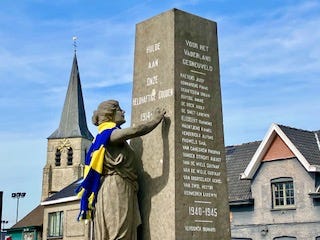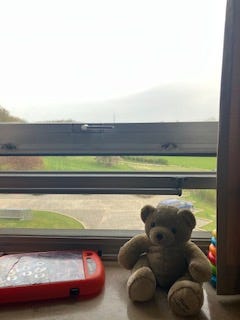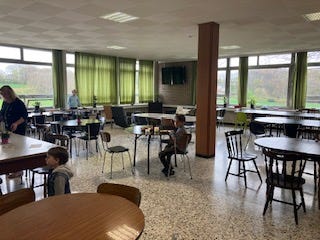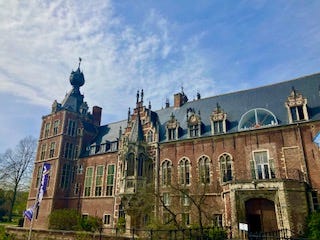DON’T LOOK
Eyewitness Story: Ukraine — Belgium



Mariana, a professional artist, and her family left their home in Kyiv to flee the Russian war in Ukraine. Since February 24, 2022, Ukrainians fled from their sieged, razed, shelled, mined, or threatened with destruction cities. Over 11 million Ukrainians — more than a quarter of the population — flew, drove, and walked from their homes without a clear destination. Many crossed the border to Moldova, Slovakia, Poland, and on to Europe and, later, America, into the complete unknown, with backpacks, kids and pets.
Mariana’s family drove across the Polish border and first arrived in Prague where they stayed with friends, then in Brussels where they temporarily stayed with caring and kind Belgian volunteers.
Then, a Ukrainian Russian-Orthodox friend invited them to Leuven, a city near Brussels, to stay at their house… but no one met them at a beautiful, airy railway station. The friend wouldn’t answer the phone. They knew no one in Leuven. It got dark.
“We thought we’d sleep at the train station,” said Mariana. “Then, a complete stranger came up to us, ‘Do you have a place to stay?’ He helped us to find shelter for one night. The next day, we found the Center for Ukrainians.”



They have been there ever since. The friend never called but sent a voice message with a prayer. Mariana played it to me: “God, save…”
“The war really brings out the best and the worst in people,” says Mariana.
The Center for Ukrainians opened in Leuven on March 21, 2022, as an effort of private donors and organizations. It is run by volunteers and a few employees. Some refugees are helping, too. Mariana’s husband, an international lawyer by education, is volunteering at the kitchen because he can’t sit around without any work. Born in Israel, he grew up in Syria but had to flee as he spoke against the regime and lived in different countries until he settled down in Ukraine.



A young Belgian man at the door says, “It’s my first time volunteering. I think I was very idealistic when I started. Reality is different: one day, we have old blankets, the next day nice and new ones, and people complain about unequal treatment and quarrel.”
The center is not the only way Leuven provides help for those in Ukraine.
“It’s wonderful here. Belgian people have been nothing but amazing. I feel that they don’t get thanked enough for everything that they do for us. They brought beds, hygiene products, and clothes. There is a playroom for children, meals three times a day, they even hired a chef!” says Mariana.



“There are ponies outside, and even they are friendly,” says Gosha.



Mariana’s other son is in Kyiv. He joined the Territorial Defence, a volunteer armed organization that fights alongside the Ukrainian army.
Mariana’s watercolors are set up neatly by the window that looks out on a pretty green hill.



“I had many art projects before the war,” says Mariana. “They all seem to be small and pale away now.”



There is a line in the canteen. The rumor is there might not be enough muffins. The mundane worries give this new, foreign reality a human dimension. Will this little girl in a pink skirt get her muffin? (Where will she live? What language will she speak? Are her parents alive?)



We take a bus to the center of the city. Mariana and Gosha show me around Leuven: a beautiful castle, a cathedral, a medieval narrow street, cherry trees in bloom. Students in bright spring jackets and old ladies with helmet-hairdos are sipping coffees outside. Dogs are playing around in the sun.



“This is a monument to a bug. They killed a lot of these bugs to use the iridescent wings to decorate the roof. Now, they commemorate it.”



“I have never been abroad. It’s a cultural shock,” says Gosha.
He takes photos of ducks and geese by the pond. There is one dead duck.
“Don’t look,” says Mariana.
I think of all the dead bodies in the videos and photos of Bucha, Borodyanka, Chernihiv in the last 47 days. Here, by the green lawn and a mirror-like pond, it is almost impossible to imagine the war. A watermill, dating back to the 17th century, is going round and round.



“I’m okay here and look forward to taking language courses,” says Gosha. “I just miss my friends.”
There is more tragedy in this family but, like most Ukrainians, Mariana and Gosha refuse to speak about it. They don’t want to feel like victims. They prefer to check out the courtyard of the castle, try a beer, plan to see the museums in Ghent and Brugge and get a Sim-card for their phones. It all might sound like a nice vacation trip. A vacation from which you can’t return home.
Read more stories of Ukrainian people:
